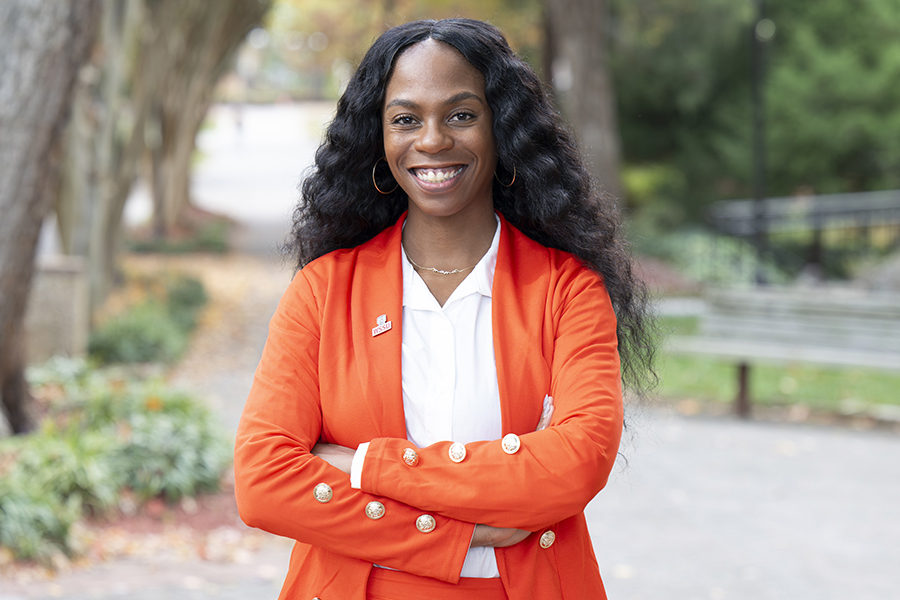Strength in Numbers
Biostatistics alumna Felicia Simpson inspires students to reach their fullest potential through statistical science

Felicia Simpson’s mother and aunt always encouraged her to dream big and pursue education beyond high school. The Albany, Georgia native considered majoring in nursing — she knew she wanted a career helping others — as she began her study at Albany State University, but math and technology were determined to have a say.
“During my first year at ASU, I took a mathematics course taught by a professor named Dr. Zephyrinus Okonkwo,” Simpson said. “His love and excitement for mathematics sparked something that made me realize my own passion for it.”
As she was completing her bachelor’s in mathematics and weighing options for graduate school, Okonkwo suggested considering a biostatistics program. The prospect resonated with Simpson, who had lost her mother unexpectedly to a stroke just a few years earlier.
“I had no idea what biostatistics was, so I started to research programs because the idea of combining my love for mathematics and helping people was intriguing,” she said. “Losing my mother at such a young age made me want to study biostatistics to understand health disparities from a statistical point of view.”
While her research focus was set, Simpson also hoped to find a graduate school with a supportive and inclusive environment like she had experienced at ASU, one of the nation’s historically Black colleges and universities. She applied to several programs but found her perfect fit at Florida State University.
“I decided to attend FSU after visiting the Department of Statistics and meeting with various faculty, including then-chair Dr. Daniel McGee,” Simpson said. “He was so warm and welcoming and took the time to answer all my questions. The faculty appeared very student-centered and engaged in interesting research.”
When Simpson earned her Ph.D. in biostatistics from FSU in 2015, Okonkwo was in the audience cheering as McGee draped the doctoral hood over her shoulders.
“What I love most about being a biostatistician is the impact of the work we do. It is exciting to develop statistical methodologies to address health-related questions arising from data and to identify risk factors for various types of diseases.”
— Felicia Simpson
“Now that I am retired and look back over my career as a professor, I remember Felicia as one of my students who has made my own professional career worthwhile,” McGee said. “Her desire to succeed began long before she attended FSU. She was fortunate to have a mother who encouraged and impressed upon her that she could accomplish whatever she chose to do.”
After graduation, Simpson accepted a position as a mathematical statistician for the U.S. Food and Drug Administration’s Center for Drug Evaluation and Research and took on an adjunct professor role at Maryland’s Montgomery College. Simpson loved working with students and decided to transition to academia, receiving an offer to join the faculty at one of the nation’s top HBCUs, Winston-Salem State University.
Simpson was promoted from assistant to associate professor and, in 2023, received the Winston-Salem State University Joseph Patterson Master Teacher Award. The same year, she was appointed chair of WSSU’s Department of Mathematics.
“It is so rewarding to introduce students to the world of statistics and biostatistics,” Simpson said. “It is a wonderful feeling to watch students I have taught over the years grow in their abilities to analyze and interpret statistical data and become confident in themselves.”
Research has also remained a focal point for Simpson, who recently received the HBCU-Undergraduate Program Research Initiation Award, supported by the National Science Foundation, to identify latent frailty profiles in African-American adults with diabetes. The project also provides hands-on training and research experiences to undergraduates.
“What I love most about being a biostatistician is the impact of the work we do," she said. "It is exciting to develop statistical methodologies to address health-related questions arising from data and to identify risk factors for various types of diseases."
Also in 2023, Simpson received the Annie T. Randall Innovator Award from the American Statistical Association in recognition of her cutting-edge statistical research in gerontology, the study of aging processes and individuals, and her role in expanding opportunities for students from underrepresented communities to enter careers in statistics.
Today, Simpson is an active member of the ASA and the Eastern North American Region of the International Biometric Society. She has also served on the ASA Committee on Minorities in Statistics and as co-chair for the ENAR Fostering Diversity in Biostatistics Workshop where she met her husband, Sean, a fellow biostatistician and professor at the Wake Forest University School of Medicine. The couple now shares a four-year-old daughter, Sophia, whom Simpson calls the light of their lives.
As Simpson sets her sights on the future, she aims to help her students realize and unlock their own potential, just as her mother, professors and advisers did for her.
“I hope to inspire others to never give up on their dreams,” Simpson said.
